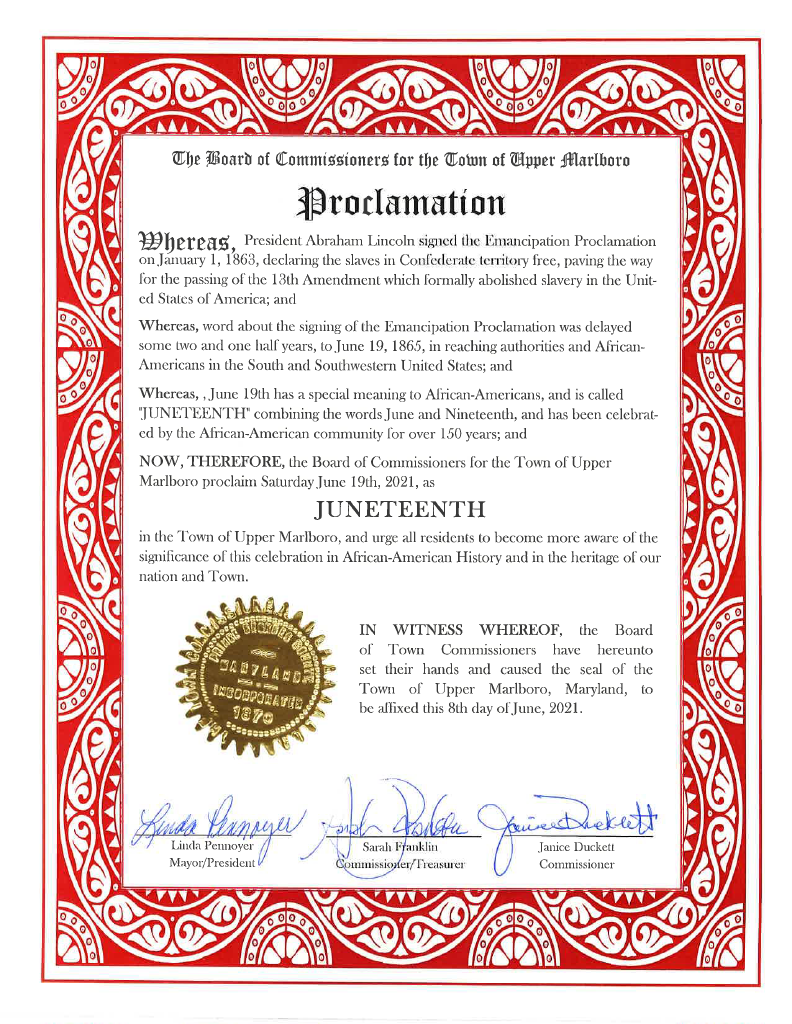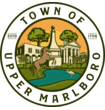Juneteenth in Upper Marlboro

Juneteenth in Maryland:
Juneteenth is recognized as a state holiday or special day of remembrance in 42 states and the District of Columbia. Although Maryland is not one of the 42 states, since 2008, the Maryland-National Capital Parks and Planning Commission (M-NCPPC) has held an annual Juneteenth celebration in Prince George's County, which showcases African-American history, genealogy, music, dance and activities for adults and children.
Note: MD became the 43rd state…
Maryland Emancipation Day traces back to November 1, 1864, when the state adopted a new constitution, which abolished slavery.
Maryland’s government was afraid that there would be too many blacks in the state so it asked slave owners to make arrangements to send their freed slaves to Africa. The Maryland Colonization Society was established to assist in transporting blacks to Africa. Court clerks provided the names of freed slaves to the Society. If a freed slave chose not to travel to Africa he was expelled from the state.
while the Maryland Union Commission focused on transporting freedmen to the south. Despite all of these efforts, freedmen still had difficulties surviving as citizens of America. Intense prejudice made social, political, and economic progress hard to achieve.
Juneteenth in PG County:
Even though Prince George’s County voted against emancipation, or freedom for the slaves, it still became Maryland law in 1864. The state then focused its attention on managing the thousands of freedmen living there.
At the end of the Civil War the United States entered the Reconstruction period. The goals of Reconstruction were to rebuild the nation and to protect newly freed slaves by helping them understand their rights and by providing them with necessities. After the 13th Amendment freed all slaves in the United States in December of 1865, the federal government created the Freedmen’s Bureau to help freed slaves adjust to their new lives. The Bureau helped to establish schools, settle contract disputes, and assist in moving freedmen to the north. With support from the Freedmen’s Bureau other state organizations provided further assistance to freed slaves.
The Friends’ Association in Aid of Freedmen helped former slaves obtain food, clothing, and housing, while the Maryland Union Commission focused on transporting freedmen to the south. Despite all of these efforts, freedmen still had difficulties surviving as citizens of America. Intense prejudice made social, political, and economic progress hard to achieve.
Smithsonian Anacostia Community Museum
Maryland and Juneteeth:
A bill requiring the governor to annually proclaim June 19 as “Juneteenth National Freedom Day” was signed, making Maryland the 43rd state to recognize the African American commemoration of the end of slavery.
After it unanimously passed the state Senate and House, Governor Martin O’Malley signed the bill on Thursday, May 15, 2014 and it takes effect on Sunday, June 1, 2014.
“In the home state of the hero and abolitionist Frederick Douglass, this is a huge moment for the movement,” said the Reverend Ronald Myers, the leader of a campaign to make Juneteenth a national observance.
Myers also serves as founder and president of the National Juneteenth Observance Foundation and the National Juneteenth Christian Leadership Council.
“This is a big day for all of us because of Maryland and now we must continue to press on until every state recognizes this and Juneteenth is a observed the way other holidays in this country are recognized,” said Myers, who is also a medical doctor and founder and director of the Myers Foundation Christian Family Health Centers which provide care to the poor and underserved in communities throughout the south and other areas.
Juneteenth, or the 19th of June, recognizes June 19, 1865, when Union Gen. Gordon Granger announced in Galveston, Texas, that all slaves in the last southern state were free. The announcement came more than two years after President Abraham Lincoln issued the Emancipation Proclamation.
Myers says that history shows that upon reading the general’s order, the former slaves celebrated jubilantly, establishing America’s second Independence Day celebration and what he called the oldest African-American holiday observance.
“The news of freedom was met with shock and joy, and in subsequent years the now free men and women began to celebrate the day they heard of their freedom with their descendants,” State. Rep Melvin Stukes (D-Baltimore), who serves Maryland’s 44th District, said in composing the bill. “Although it declined in popularity during the early 20th century, there has recently been a resurgence of interest in the holiday and several presidents have also observed Juneteenth.
Myers says he particularly thanks Stukes for leading the efforts in Maryland and he is optimistic that other states will also pass legislation to observe the holiday.
Currently, there are seven states that do not recognize Juneteenth including Arizona, Hawaii, Montana, New Hampshire, North Dakota, South Dakota and Utah.
Reportedly, Democratic Senator Martha Fuller Clark of New Hampshire is pushing hard for that state to recognize Juneteenth.
“It seems to me that this is an opportunity to recognize and honor an important tradition in the history of African Americans, and it’s hard for me to see why anyone would object to New Hampshire doing this,” Clark told the Concord Monitor in New Hampshire.
Myers says momentum has built nationwide and his efforts have even received the support of former Alaska Governor Sarah Palin, Republican Texas Senator John Cornyn, Republican Kansas Senator Pat Roberts and others. He went on to say that he continues working to get presidential support and he hopes that President Barack Obama will eventually issue a Juneteenth Proclamation at the White House.
“Why not? When Obama was a senator he spoke in support of it,” Myers said. “And, the White House was built by enslaved Americans of African descent during the tyranny of slavery.”
10 Facts:
Fact #1: Following the issuing of the Emancipation Proclamation on January 1, 1863, not all enslaved people immediately found freedom.
The Emancipation Proclamation freed slaves in states then in rebellion against the United States. Union troops operating in said states gave teeth to the Proclamation. This, however, did not apply to the border states.
Fact #2: The Civil War ended in the summer of 1865. Union General Gordon Granger and his troops traveled to Galveston, Texas to announce General Orders No. 3 on June 19, 1865. June 19th would go on to be known and celebrated as Juneteenth.
General Orders No. 3 stated: “The people of Texas are informed that, in accordance with a proclamation from the Executive of the United States, all slaves are free. This involves an absolute equality of personal rights and rights of property between former masters and slaves, and the connection heretofore existing between them becomes that between employer and hired labor."
Fact #3: Part of General Order No. 3 encouraged the newly freed people to remain with their past owners.
“The freedmen are advised to remain quietly at their present homes and work for wages. They are informed that they will not be allowed to collect at military posts and that they will not be supported in idleness either there or elsewhere.”
Fact #4: The period after Juneteenth is known as the ‘Scatter.’
Undeterred by the recommendation to remain in place, many former slaves left the area during the original reading. In the following weeks formerly enslaved people left Texas in great numbers to find family members and make their way in the postbellum United States.
Fact #5: Juneteenth has been celebrated under many names.
Freedom Day, Jubilee Day, and Cel-Liberation Day, Second Independence Day, and Emancipation Day to name just a few.
Fact #6: Emancipation Park in Houston, Texas was bought specifically to celebrate Juneteenth.
The 10-acre parcel of land was purchased by former slaves, Richard Allen, Richard Brock, Jack Yates, and Elias Dibble for $800 in 1872.
Fact #7: During the early 20th-century Juneteenth celebrations declined.
The enactment of Jim Crow laws dampened the celebration of freedom. In addition, the Great Depression forced many black farming families away from rural areas and into urban environments to seek work— resulting in difficulty taking the day off to celebrate.
Fact #8: The celebration of Juneteenth was revived during the civil rights movement.
The Poor People's March planned by Martin Luther King Jr. was purposely scheduled to coincide with the date. March participants took the celebrations back to their home states and soon the holiday was reborn.
Fact #9: Celebrations of Juneteenth continue today.
Traditions include public readings of the Emancipation Proclamation, singing traditional songs, and reading of works by noted African American writers. Celebrations can also take the form of rodeos, street fairs, cookouts, family reunions, park parties, historical reenactments, and Miss Juneteenth contests.
Fact #10: Forty-nine states and the District of Columbia recognize Juneteenth as either a state holiday or ceremonial holiday, a day of observance.
Hawaii and North Dakota became the latest states to formally recognize Juneteenth in April 2021. In South Dakota, measures to observe Juneteenth are under discussion. As of this writing, the Senate unanimously passed a resolution establishing Juneteenth as a federal holiday on Tuesday, June 15, 2021. It still needs to pass through the House and be signed by President Biden to become a federal law.

